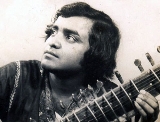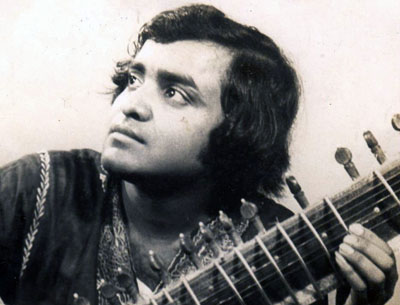
Kirit Khan
Encyclopedia
Ustad Kirit Khan was a talented Sitar player of the Indian subcontinent. He was born on 29 October 1955 in Comilla, Bangladesh
and later settled in Kolkata, India
. He comes of an internationally renowned illustrious family of musicians of Bangladesh, which produced a galaxy of famous classical musicians like, Ustad (Maestro of Music) Dr. Alauddin Khan, the world reputed Maestro of Seni-Maihar and Alauddin Gharana of Hindustani Classical Music
(North Indian Style), Ustad Ayet Ali Khan (his grand father), Ustad Dr. Ali Akbar Khan
, Pandit Ravi Shankar
, Ustad Bahadur Khan
(his father), Ustad Khadem Hossain Khan, Ustad Abed Hossain Khan, Ustad Mir Kashem Khan, Ustad Phuljhuri Khan
, Ustad Khurshid Khan, Ustad Shahadat Hossain Khan
, Annapurna Devi, Reenat Fauzia
and many others. He is the second son of Ustad Bahadur Khan, a reputed Sarod
artiste and the younger brother of talented Sarod
player Bidyut Khan
, who was still actively propagating the musical culture of the family until his recent illness. Kirit Khan died prematurely in 2006 due to kidney failure.

Portrait of Kirit Khan, Source: Monthly Sargam, Dhaka, October 2006
and later on Sitar
. He learnt Sitar from his father Ustad Bahadur Khan till his death in 1989. He acquired sheer virtuosity in his fingers under the strict mentorship of his father. In 1976 he appeared in front of audience with a duet concert (Sitar and Sarod) with his father and that was the start of his glorious career. From then on he played Sitar at home and abroad consistently.
In 1987 he was showered with appreciation for his solo Sitar recitals in Mumbai organized by 'Ustad Abdul Halim Zafar Khan Academy'.
In the same year (1987) he participated in a duet concert with his father in 'Tansen Music Conference'.
In 1991 he was highly appreciated at the 'Surdas Music Conference' in Kolkata.
In 1999 he was highly acclaimed by audience at the 'Dover lane Music Conference' in Kolkata.
Then in 1988 he rendered his recitals in Germany, and England.
In 1989 he played sitar in Middle East.
In 1999 he performed in Denmark, Switzerland, N. Ireland (Belfast), and Scotland (Edinburgh).
In 2003 he performed in South America (Colombia, Bolivia, and Peru), and Sweden.
In 1984 he obtained the title Suramani from the ‘Haridas Music Conference’, and later Surjhankar in Mumbai.
In 1985 he was given a reception in Brahmanbaria, Bangladesh, as the soil’s bright son, with a golden key as a token of their sincere appreciation.
He also worked as assistant Music director in Bangla films ‘Natun Pata’, ‘Jukti Takko Goppo’, ‘Je Jekhane Dariye’.
He was the solo music director of the film Nilkanya.
He started a documentary film called ‘Gharana and Parampara’ which has been sponsored by Government of India. The theme of the film was to make the younger generation aware of Parampara (Teacher-student interactive learning) and concept of Gharana (Schools of music).
He was a visiting teacher on sitar in Indian Music Academy in Frankfurt, Germany.
Bangladesh
Bangladesh , officially the People's Republic of Bangladesh is a sovereign state located in South Asia. It is bordered by India on all sides except for a small border with Burma to the far southeast and by the Bay of Bengal to the south...
and later settled in Kolkata, India
India
India , officially the Republic of India , is a country in South Asia. It is the seventh-largest country by geographical area, the second-most populous country with over 1.2 billion people, and the most populous democracy in the world...
. He comes of an internationally renowned illustrious family of musicians of Bangladesh, which produced a galaxy of famous classical musicians like, Ustad (Maestro of Music) Dr. Alauddin Khan, the world reputed Maestro of Seni-Maihar and Alauddin Gharana of Hindustani Classical Music
Hindustani classical music
Hindustani classical music is the Hindustani or North Indian style of Indian classical music found throughout the northern Indian subcontinent. The style is sometimes called North Indian Classical Music or Shāstriya Sangeet...
(North Indian Style), Ustad Ayet Ali Khan (his grand father), Ustad Dr. Ali Akbar Khan
Ali Akbar Khan
Ali Akbar Khan , often referred to as Khansahib or by the title Ustad , was a Hindustani classical musician of the Maihar gharana, known for his virtuosity in playing the sarod...
, Pandit Ravi Shankar
Ravi Shankar
Ravi Shankar , often referred to by the title Pandit, is an Indian musician and composer who plays the plucked string instrument sitar. He has been described as the best known contemporary Indian musician by Hans Neuhoff in Musik in Geschichte und Gegenwart.Shankar was born in Varanasi and spent...
, Ustad Bahadur Khan
Bahadur Khan
Ustad Bahadur Khan was a sarod player.-Early Life & Family:Ustad Bahadur Khan, a Bengali, was born on January 19, 1931 in Shibpur, Comilla, Bangladesh, , and died on October 3, 1989 in Calcutta, India...
(his father), Ustad Khadem Hossain Khan, Ustad Abed Hossain Khan, Ustad Mir Kashem Khan, Ustad Phuljhuri Khan
Phuljhuri Khan
Ustad Phuljhuri Khan was a Tabla and Esraj Player from Bangladesh. He was also an accomplished Sanai, Sitar and Pakhawaj player. Commemorative Stamp on Ustad Phuljhuri Khan by Government of Bangladesh...
, Ustad Khurshid Khan, Ustad Shahadat Hossain Khan
Shahadat Hossain Khan
Ustad Shahadat Hossain Khan was born in Comilla, Bangladesh, on July 1958. He is the only son of Ustad Abed Hossain Khan. He comes of a family of great musicians of the sub-continent...
, Annapurna Devi, Reenat Fauzia
Reenat Fauzia
Born in 1967, Reenat Fauzia, a noted Sitarist, daughter of Mobarak Hossain Khan, a distinguished musicologist and litterateur, and a renowned Surbahar artiste, and Fauzia Khan, famous vocal artiste, comes of an internationally renowned family of musicians of Bangladesh...
and many others. He is the second son of Ustad Bahadur Khan, a reputed Sarod
Sarod
The sarod is a stringed musical instrument, used mainly in Indian classical music. Along with the sitar, it is the most popular and prominent instrument in the classical music of Hindustan...
artiste and the younger brother of talented Sarod
Sarod
The sarod is a stringed musical instrument, used mainly in Indian classical music. Along with the sitar, it is the most popular and prominent instrument in the classical music of Hindustan...
player Bidyut Khan
Bidyut Khan
Bidyut Khan is a Bengali Sarod player.-Family and early life:Khan is the elder son of sarod player Ustad Bahadur Khan. Other notable members of the family are his grandfather Ustad Ayet Ali Khan, Ustad Dr. Alauddin Khan , Ustad Dr...
, who was still actively propagating the musical culture of the family until his recent illness. Kirit Khan died prematurely in 2006 due to kidney failure.

Portrait of Kirit Khan, Source: Monthly Sargam, Dhaka, October 2006
Early life
At the age of seven, Kirit started learning music. First he took his lessons on TablaTabla
The tabla is a popular Indian percussion instrument used in Hindustani classical music and in popular and devotional music of the Indian subcontinent. The instrument consists of a pair of hand drums of contrasting sizes and timbres...
and later on Sitar
Sitar
The 'Tablaman' is a plucked stringed instrument predominantly used in Hindustani classical music, where it has been ubiquitous since the Middle Ages...
. He learnt Sitar from his father Ustad Bahadur Khan till his death in 1989. He acquired sheer virtuosity in his fingers under the strict mentorship of his father. In 1976 he appeared in front of audience with a duet concert (Sitar and Sarod) with his father and that was the start of his glorious career. From then on he played Sitar at home and abroad consistently.
Performance in Major Concerts in India
Among his memorable concerts is a duet performance with his father in the 'Sursringer Music Conference' in Mumbai in 1986.In 1987 he was showered with appreciation for his solo Sitar recitals in Mumbai organized by 'Ustad Abdul Halim Zafar Khan Academy'.
In the same year (1987) he participated in a duet concert with his father in 'Tansen Music Conference'.
In 1991 he was highly appreciated at the 'Surdas Music Conference' in Kolkata.
In 1999 he was highly acclaimed by audience at the 'Dover lane Music Conference' in Kolkata.
Tours
He had toured different countries in the world performing with his Sitar since 1978. The first countries he toured are Russia, and Cuba.Then in 1988 he rendered his recitals in Germany, and England.
In 1989 he played sitar in Middle East.
In 1999 he performed in Denmark, Switzerland, N. Ireland (Belfast), and Scotland (Edinburgh).
In 2003 he performed in South America (Colombia, Bolivia, and Peru), and Sweden.
Awards and recognition
He received several awards and appreciation for his contribution in music.In 1984 he obtained the title Suramani from the ‘Haridas Music Conference’, and later Surjhankar in Mumbai.
In 1985 he was given a reception in Brahmanbaria, Bangladesh, as the soil’s bright son, with a golden key as a token of their sincere appreciation.
Music Direction in Films
Besides playing sitar he also engaged himself as a music director in different films. He worked with his father as an assistant music director in Hindi Films ‘Garam Hawa’, ‘Amabashya Ki Chand’.He also worked as assistant Music director in Bangla films ‘Natun Pata’, ‘Jukti Takko Goppo’, ‘Je Jekhane Dariye’.
He was the solo music director of the film Nilkanya.
He started a documentary film called ‘Gharana and Parampara’ which has been sponsored by Government of India. The theme of the film was to make the younger generation aware of Parampara (Teacher-student interactive learning) and concept of Gharana (Schools of music).
Teaching Sitar
Though a busy artiste he also engaged himself as a music teacher In Ustad Bahadur Khan Music Academy in Kolkata and thus played a role to spread Indian classical instrumental music.He was a visiting teacher on sitar in Indian Music Academy in Frankfurt, Germany.
External links
- Pracheen Kala Kendra (Copyright © 2005), Baithak Programme
- Ustad Bahadur Khan
- 'Ramkanai Das captivates audience', Daily New Age, March 24, 2006
- ‘Music fest at Ravindra Bharati’ The Times of India, October 28, 2003
- 'Sangeet Swarn: A golden chance for music lovers' The Tribune, Chandigarh, October 28, 2003

